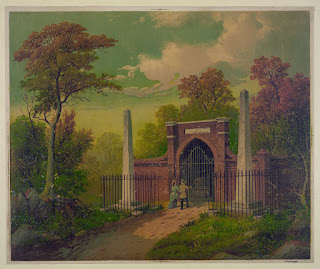The tomb of George Washington
The Mount Vernon Ladies' Association took over operation
of George Washington’s estate at Mount Vernon in 1860 in an effort to stabilize
and restore the mansion. As restoration efforts progressed, the American Civil
War broke out. Throughout the war, the estate was managed by two staff members
a Northerner and a Southerner.
Washington’s tomb was a place of
veneration for both Union and Confederate soldiers. Soldiers visiting the estate were requested to be neither
armed nor dressed in military uniform. Such actions ensured that Mount Vernon
remained neutral, hallowed ground. Mount Vernon remained safe and open
throughout the war.
During the war, some soldiers left their names or initials
etched on the brick wall surrounding the tomb of George Washington. Most of this graffiti was left by soldiers
whose identity has been lost to history, but there is one notable exception, Joshua Lawrence Chamberlain.
Chamberlain is thought by some to have prevented the
Confederate army from winning the Battle of Gettysburg. Chamberlain
was commissioned a lieutenant colonel in the 20th Maine Volunteer Infantry Regiment in 1862. He became commander of the regiment in
June 1863. On July 2, during the Battle of Gettysburg, Chamberlain's regiment
occupied the extreme left of the Union lines at Little Round
Top. Chamberlain's men withstood repeated assaults and
finally drove the Confederates away with a bayonet charge. Had the
Confederates taken Little Round Top they would have rolled up the Union line,
won the Battle of Gettysburg, and changed the course of history.
Chamberlain’s name is carved into the brick wall of the tomb
near the American flag.









No comments:
Post a Comment